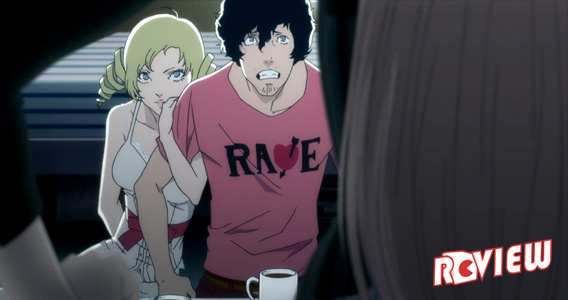
A monstrous baby and grotesque sexual mutations of the female form cast ominous and destructive shadows over the nightmares of Vincent Brooks, who finds himself dragged into a dark dream world each night – a nightmare realm where men seem to be punished for the crime of living wasted lives. Aside from the philosophical attachment, the weight of this crime is the way in which Vincent’s indecision and resistance to adulthood cause others to suffer, specifically his long-term girlfriend, Katherine.
Having followed the development of Atlus’ original HD title for some time, I’d anticipated finding plenty to discuss in these manifestations of male fears, seemingly stepping out of the mind of David Cronenberg and so dramatically intent on literally crushing Vincent beneath the weight of their significance – and in that regard I was certainly not disappointed or left wanting for words.
And yet, the truly frightening part of watching Vincent’s fears of a relationship with girlfriend Katherine, and the way that fear feeds a sudden affair when the mysterious and seductive Catherine appears, hits a note so personal, that the academic leanings must give way. The most terrifying element of Catherine is the similarities I’ve drawn between Vincent and myself.
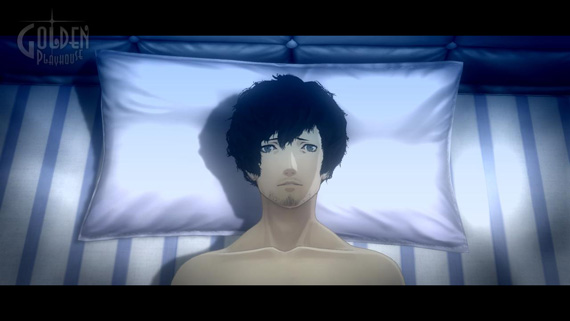
The way in which Vincent distances himself as Katherine discusses the responsibilities of serious commitment, and the way Vincent seems to simply follow the flow of events around him rather than making active decisions to determine his own fate, cut too close to the bone for comfort. Certainly we must sometimes step outside our comfort zone to mine words worth reading, but Vincent’s resistance to the possibility of a fuller life mirror my own and leave me at a loss for words of an unguarded nature suitable for public consumption. The pain that Vincent brings upon himself leaves me unable to avoid facing my own sad state of affairs.
So I’ve dragged my heels on this review as long as I can. For all the words I’ve thrown at the medium, all the times I’ve said that videogames have the potential to deliver experiences that no other medium before it has, I am undone by a game that has captured the male identity in a way I was entirely unprepared for.
For all the times I’ve dissected female characters in gaming, largely from a perspective of the male hands that control their narratives, Atlus has delivered a truly subversive experience. Subversive for its earnest attempts to capture life, and for the ways in which that attempt sparks chilling moments of self realization, far more deadly than the surface monstrosities the game initially caught attention with.
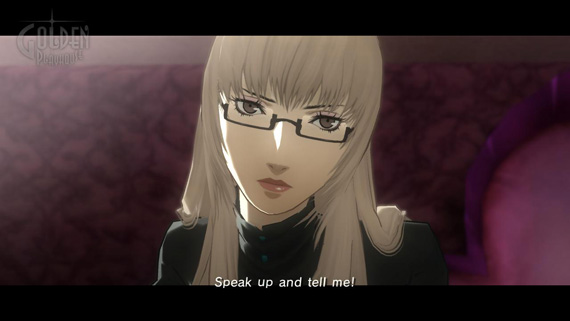
Tea cools between Vincent and Katherine as the latter discusses relationships; friends getting married, even more starting families. As the largely one-sided conversation develops, I can feel Vincent’s spine pushing against the chair, feel his urge to sink under the table as some feeble defense against the unavoidable need for him to simply grow up and become a man. I know Vincent hasn’t yet become one, because I’m sitting in front of my PlayStation 3 in boxer shorts playing a game about Vincent climbing an endless series of blocks in his boxer shorts, and relate to his dilemma more than I care to admit.
That isn’t some sudden argument against the cultural delicacies that we all enjoy here, but simply an acknowledgement of the misfiring neurons leaving Vincent unable to prioritize his loves.
Vincent’s nights are filled by visits to the Stray Sheep Bar, drinking with friends, checking text messages, and playing the arcade game in the corner by the bathroom. And this became one of my favorite ways to pass time in Catherine, lingering to hear stories from other people, avoiding the pressures of the day and the nightmares that await when I leave. There were plenty of nights I never wanted to leave, hoping to hear a little more cocktail trivia to help fight off the need for sleep and the dark dreams that serve as the core gameplay waiting within Catherine. And sometimes I waited on the chance text from Catherine that gave another taste of her kinky interest in photography.
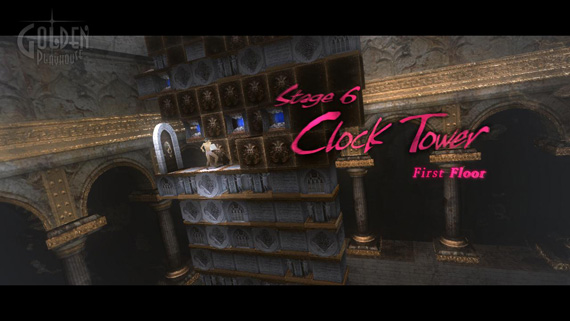
The nightmare realm awaits Vincent’s return home, endless towers of blocks that must be manipulated to form stairways that can lead him to the exit. And what an utterly simplistic and brilliant development Atlus brings to the table, where a man faces the physical manifestation of his fears and quite literally builds a path in the hope of surviving said fears and reaching new levels of personal growth – so obviously insightful and clever that it seems ridiculous to draw attention to it.
Reaching the end of each nightmare stage brings Vincent back to the waking world safely, while other stray sheep are not so lucky and fall to their death, never to wake again. As for myself, I woke with my mind working out odd solutions to these puzzling blocks – I’d be out talking with people and suddenly devise a strategy that had alluded me the night before and have to run home to test my theory.
Catherine’s puzzle core infects the subconscious that way, with something seemingly simplistic, endlessly enjoyable, and capable of continual evolution. Atlus adds different flavors of blocks to spice the stew – ice blocks, heavy blocks that slow players down, torture boxes that release spikes, and monster boxes that move on their own and are quite simply, jerks. This fundamental formula of gameplay can be likened to other joys, such as rolling endless Katamari, running with Faith over rooftops, and abusing a Portal Gun in the Aperture Science Labs – activities that could continue on forever, and still present players with immediate tactile pleasure and deeper mental challenges regardless of the play duration.
The rising difficulty of Catherine’s stage progression convinces a natural evolution. Despite the number of times I found myself shutting off my console and walking away in anger, I was never long for returning to the dance, which doesn’t resort to cheap trickery, but rather challenges players to build on what they’ve learned and continually pushes them to embrace multidimensional thinking. It’s startling how many times a plateau presented block spacings that seemed impossible to overcome, and then while nursing a coffee in quiet contemplation, the simplicity of the solution would grab me and the climb to freedom continued.
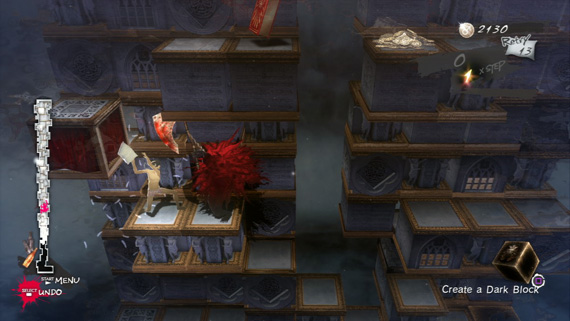
Each morning seems to bring me deeper into conflict with Vincent’s love triangle between Catherine and Katherine. Vincent’s inability to make an active decision finds Catherine waking up in his bed, and Katherine floating and fading further away from his distancing indecision.
This is where morality comes into play, with Catherine offering choices throughout the game that lead players to multiple endings. As with any game, there is always a slap in the face that draws immediate attention to the fact that you are making a moral decision with game ending consequences. Curiously however, Catherine seems to acknowledge and accept this limitation, often simply asking players what they want from life.
“Do you want a peaceful life?”
In that way, it is somewhat believable that the ending each player discovers will possess the capability to speak to them, if they in turn bring some earnest answers to the game.
Every answer in the game also offers players a pie-chart, detailing what other players answered, and offering delightful insight that found me happy to have company in my choices at times, and at other times utterly convinced that other players were full of lies.
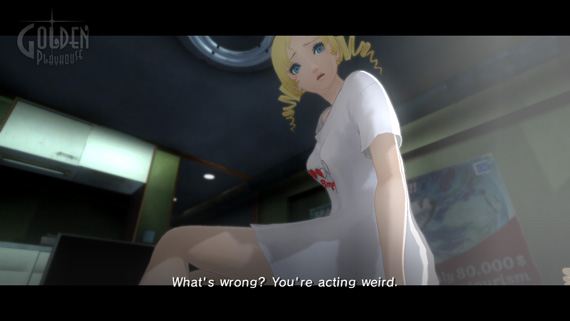
What was my ending? I’ll say that it involved growing up, realizing what Vincent wanted and needed to be happy in life, and risking everything he had left to gain back what his indecision had nearly cost him.
How pretty life would be if it could imitate art quite so well on command.
How maddening and unsettling it is to finally find a game that speaks to male identity, sans lasers and bravado, only to find it run me in circles, spiraling down to uncomfortable truths and a potentially failed review.
I want to suggest that there’s an anti-hero element to Vincent, not in the way Clint Eastwood once wandered into town with no name and plenty of bullets, but more in the way Harrison Ford portrayed Deckard in Blade Runner – a man who was simply trying to survive and often had very human reactions when confronted by danger. In a loose way I can tie a ribbon to that thread here, with the way Vincent’s story develops with a series of choices that make him less than heroic, but don’t make him purposefully villainous. Vincent is simply human, and the earnest portrayal of his character and plight open the door to intense empathy. And it’s an incredible accomplishment, a more earnest than glorious portrayal that we can relate to, even if doing so forces us to accept less than ideal elements of our own identity.
I believe every videogame asks for its own review. To offer any less only denies the writer and reader in equal measure. In that light, Catherine is a horrible bitch goddess for asking me to write this one, and it remains a task only half met by me here. But Catherine also joins a small set of releases among the most significant ever developed, and you’d be doing yourself a disservice by missing it.
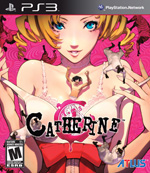
Very interesting review. Even though I haven’t had much time to play any games lately I think you might have piqued my interest just enough to try this one out…
Comment by Gwenyth Love — September 4, 2011 @ 5:34 pm
Definitely check it out. Then come back and let me know what you think.
Comment by Jamie Love — September 5, 2011 @ 2:35 am
Pre-ordered the Regular Edition (great artbook and soundtra k) and its in my games drawer waiting for its turn. Waiting for he next geat Atlus release!
Comment by EdEN — September 4, 2011 @ 9:18 pm